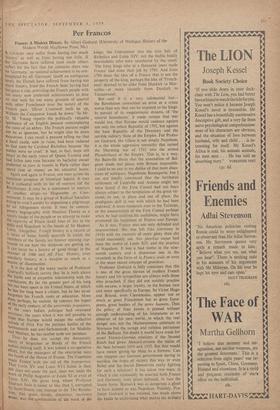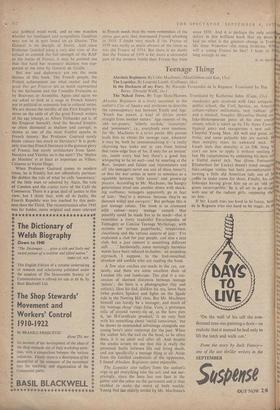Per Francos
France: A Modern History. By Albert Gudrard. (University of Michigan History of the
Modern World: Mayflower Press, 70s.) A COUNTRY may suffer from having too much 'history' as well as from having too little. If the Germans have suffered (and made others safer) for the fact that for centuries there was no 'Germany,' no national achievement to be con- templated by all 'Germans' (itself an ambiguous term), the French have suffered from having too much history, from the French State having had too great a role, providing the French people with too many now irrelevant achievements to dote on and with far too many grounds of quarrel with other Frenchmen over the nature of the French past. 'Oliver Cromwell built he up, William the Conqueror knock he down.' So Mr. G. M. Young reports the politically valuable ignorance of an English peasant contemplating the ruins of an abbey. The French peasant might not be as ignorant, but he might also be more rancorous. I can recall a peasant telling me that a local castle, now in ruins, had been reduced to that state by Cardinal Richelieu because 'the nobles were so cruel.' It had, in fact, been still intact in the early years of Queen Victoria and had fallen into ruin because its bachelor owner preferred to faire to bombe in Paris rather than spend time or money on his ancestral home. Again and again in France, one runs across the tenacious presence of historical legend. It may he a cathedral with its list of martyrs (of the Revolution). It may be a monument to martyrs of another stripe--to Huguenots or Com- niunards. It may be a group of Radical Socialists trying to rival Lourdes by organising a pilgrimage to an Albigensian shrine. It may be contem- porary hagiography with Maurice Thorez as a saintly leader of the people or an attempt to make the captivity of Main recall Joan Of Arc at the stake and Napoleon in the hands of Sir Hudson l'ov'e. Altogether, French history is a record of series of bitter family quarrels in which the 1,1tembers of the family are forever opening cup- boards to see how the skeletons are getting on. It can never be a history of 'good things' in the manner of 1066 and All That. History, even scholarly history, is a weapon as much as a means of illumination. It is the first of the many merits of Professor Guerard's brilliant survey that he is both above the battle and in empathic relationship with the combatants. By far the greater part of his long ;ilk has been spent in the United States, of which for has for long been a citizen, but he has never ;,?rgotten his French roots or education. More (1,14,4n, perhaps, he realises, he conveys the hopes of the early century, of the universites populaires, the years before politique had swamped 13,1).8lique. the years when it was still possible to _Hope that Europe would escape the collective s_tneide of 1914. For the partisan battles of the orbonnards and anti-Sorbonnards, for Madelin and S
Mathiez, he has neither taste nor patience.
bus - he does not accept the democratic thesis of Seignobos or Benda of the French niation. making itself. It was indeed a co-operative °rn, but the managers of the enterprise were the heads of the House of France. The Capetians made o France with the aid of the bourgeoisie. That Louis XV and Louis XVI failed in their 1.(.21.b does not undo the past, does not undo the l'oo's of Philip Augustus or Louis XI or even of XIV, the great king whom Professor uerard finds it easier to like than I. corrupted _by Saint-Simon, can manage to do. The Revolu- tio, that great, heroic, disastrous, necessary event, was- the continuation of the work of the
kings; the Convention was the true heir of Richelieu and Louis XIV, not the feeble bodily descendants who were smothered by the court. 'The forty kings who in a thousand years made France' had done their job by 1789. And from 1789 dates the idea of a France that is not the property of the king, perhaps the idea of 'French- men' deemed to be alike from Dunkirk to Mar- seilles—or more recently from Dunkirk to Tamanrasset.
But—and it is a very substantial but— the Revolution committed an error or a crime worse than any that can be imputed to the kings. In pursuit of its megalomanic dreams, of 'the natural boundaries,' it made certain that war would last, that Europe would coalesce against not only the infant Republic of 1792, but against the base Republic of the Directory and the terrible military State of the Empire. For Profes- sor Gudrard, the villain is not simply Napoleon, it is the whole aggressive mentality that turned the liberating war of 1792 into the armed Plunderbund of the Empire. This is, in a way, the Bainville thesis that the annexation of Bel- gium made real peace with Britain impossible. I yield to no one in my dislike of that most disas- trous of ft:cheques, Napoleone Buonaparte, but I am not totally convinced that the territorial settlement of Lundville and Amiens might not have lasted if the First Consul had not been always subject to the temptation of the great vir- tuoso, to use, in place and out of place, the prodigious skill in war with which he had been endowed. A more moderate man in the Tuileries, or the assassination of the First Consul perhaps when he had outlived his usefulness, might have promoted the happiness of France and Europe.
As it was, France was not only defeated and impoverished. She was left (like Germany in 19181 with the memory of more glory than she could reasonably use. Nec plurihus impar had been the motto of Louis XIV and the practice of Napoleon. It was a bad motto in the nine- teenth century and a disastrous one in the twentieth in the form of la France scale or even in the more recent concept of grandeur.
Professor Gudrard is fully conscious that this is one of the great themes of modern French history and his sympathies are always with those who preached, if they did not notably practise with success, a larger loyalty, to the human race and more specifically to Europe. So Victor Hugo and Briand, even Clemenceau, appear not so much as great Frenchmen but as great Euro- peans, great leaders of the genre Mullah:. Thus the policy of Jean Jaures is praised without enough understanding of his limitations as an observer of his own world, in which the real danger was not the Mannessmann contracts in Morocco but the savage and ruthless patriotism of the Balkans. No doubt it would have made for easier Franco-German relations if the Second Reich had given Alsace-Lorraine the status of the Saar between 1919 and 1935. But that would have meant giving up Metz as a fortress. Can one imagine any German government daring to sacrifice the fruits of victory this way or even Babel and the Social Democrats really fighting for such a solution'? It has taken two wars, in which it can reasonably be asserted both France and Germany were tiwice defeated, to ram the lesson home. Bismarck was as dangerous a ghost to have around as was Napoleon. Possibly, Pro- fessor Gudrard is too rational, too much above the battle to understand what makes the military and political mind work, and so one wonders whether his intelligent and sympathetic Gaullism may not be in part based on an illusion. The General is no disciple of Jaures. And since Professor Gudrard takes a very dim view of the refusal to commit the full strength of the RAF to the battle of France, it may be pointed out that this hard but necessary decision was sup- ported at the time by General de Gaulle.
But war and diplomacy are not the main themes of this book. The French people, the French achievement are what matter and the gesta Del per Francos are as much represented by the Sorbonne and the Comedie Francaise as by Bouvines or Austerlitz. Again and again we are asked to look at a stage in French history not in political or economic but in cultural terms. We are shown the sterility of the First Empire by stress on the exile of all the great French writers of the age (except, as Albert Thibaudet put it, of the Emperor himself). And the Second Empire, so often dismissed as shallow and corrupt, is shown as one of the most fruitful epochs in French history. But Professor Guerard surely limits culture too much to literature? It is prob- ably true that French literature is the greatest glory of France, but surely architecture from Saint- Nectaire and V6zeley on is the next? The 'Maitre de Moulins' is at least as important as Villon; Cdzanne as Victor Hugo.
When Professor Gudrard comes to modern times, he is frankly but not offensively partisan. He dislikes the rule of what he calls `mesocracy,' of the little man so admired by Alain, the rule of Combes and the esprits forts of the Café du Cominerce. There is a great deal of justice in this view, but I think that, with all its faults, the Fourth Republic was less marked by this petti- ness than the Third. The reconstruction after 1945 was far bolder, more original and more relevant to French needs than the mere restoration of the status quo ante that dominated French planning in 1919. 1 doubt very much if the France of 1939 was really as much abreast of the times as was the France of 1914. But there is no doubt that the France of 1959 is far more a successful part of the modern world than France has been
at f rid or f t■
since 18701 And it is perhaps the only serif defect in this brilliant book that no stress laid on what is the greatest change in Frew: life since Waterloo—the rising birthrate. Wly will a young France be like? I hope to I long enough to see.
D. W. BItCK
.0 ect



































 Previous page
Previous page